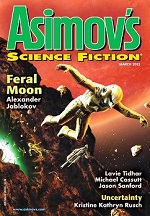Uncertainty
- by Kristine Kathryn Rusch
- Short Story
- Science Fiction
- Adults
- Definite Time Travel
- English
- “Uncertainty” by Kristine Kathryn Rusch, in Asimov’s Science Fiction, February 2013.
For me, the main story of time-travel agent Leah wandering from one World War II encounter with Heisenberg to another did not have a clear notion of time travel, and the ties to the uncertainty principle were not germane to the story. The exposition of the uncertainty principle itself was also confused, conflating it with the observer effect and not correctly representing the fact that a particle cannot simultaneously possess both a sharply localized position and a sharply localized momentum. On the other hand, I did enjoy the opening scene with Moe Berg, and the mix-ups are partly from his layman’s point-of-view.
Werner Heisenberg’s controversial uncertainty principle was one of the cornerstones of quantum physics. Heisenberg postulated that it was possible to know a particle’s position or that it was possible to know how fast the particle moved, but no one could know both the position and movement of the particle at the same time. Berg had spent quite a bit of time in Oxford, talking with leading scientists as he prepared for this job, and one of them used a description that moved away from particles into theory, which Berg appreciated. That scientist had told Berg that at its core, Heisenberg’s principle meant this: The act of observing changes the thing being observed.

Variants
(1)
- “Uncertainty” by Kristine Kathryn Rusch, in Asimov’s Science Fiction, February 2013.
